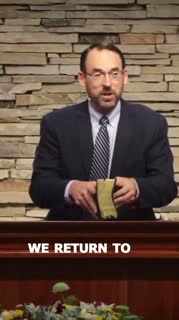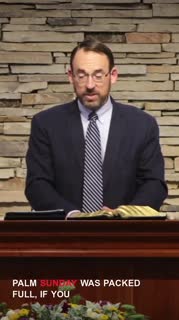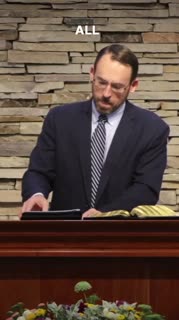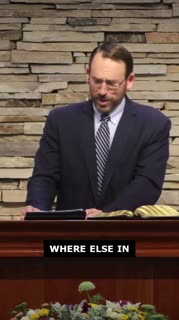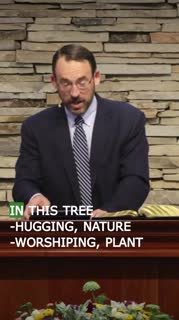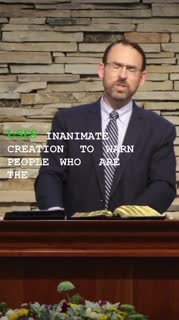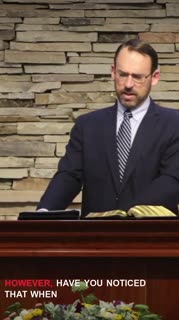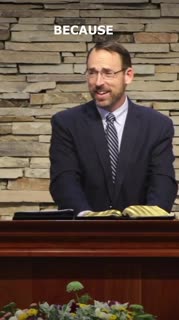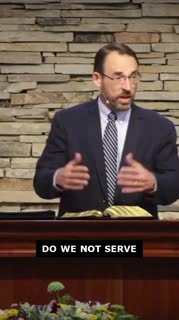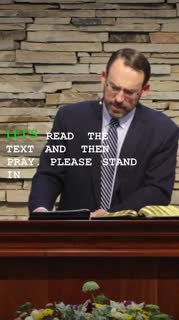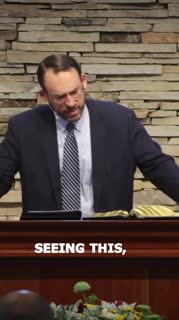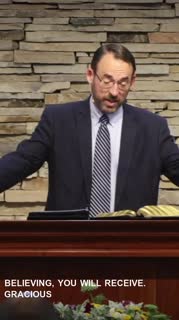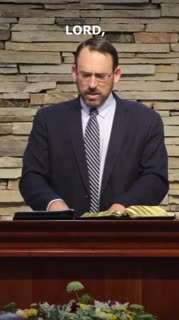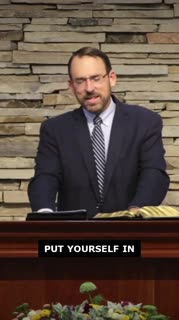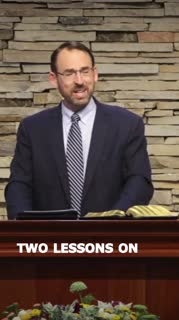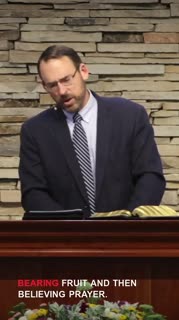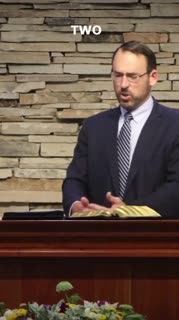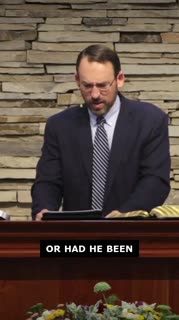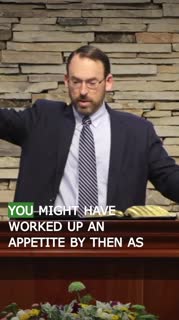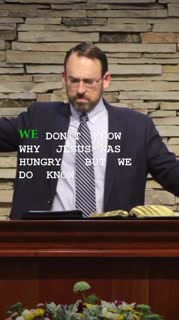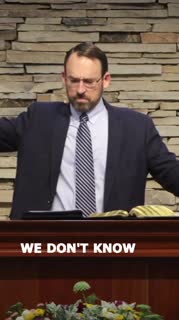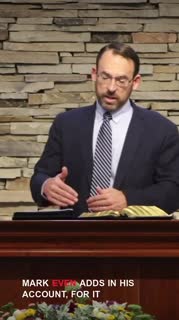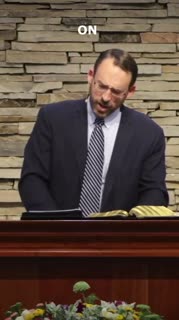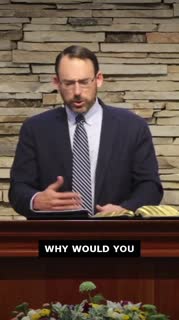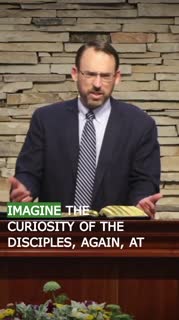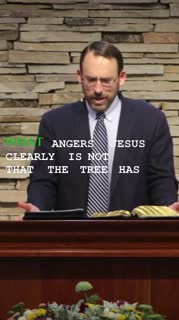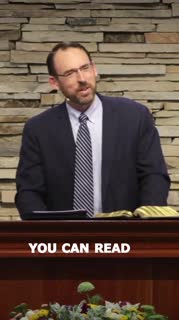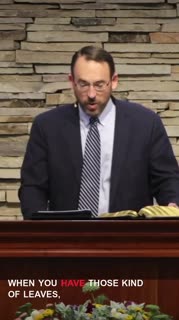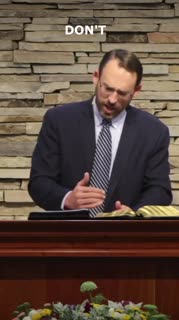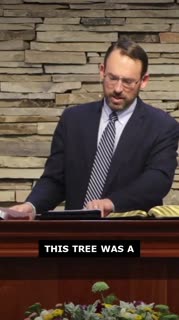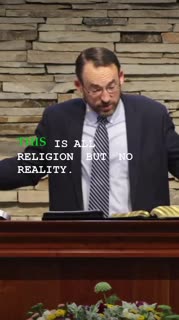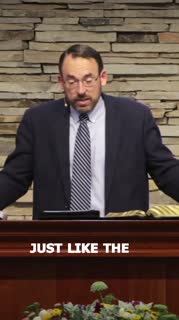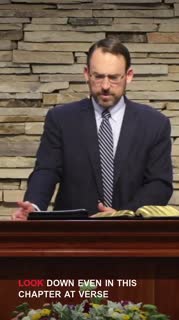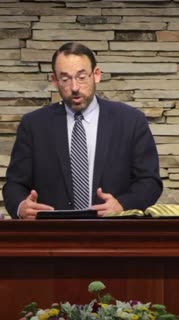Faith, Fruitfulness, and the Warning of Hypocrisy
Devotional
Sermon Summary
Bible Study Guide
Sermon Clips
"We return to Matthew 21, turn to the 21st chapter of Matthew, we come to a short little five-verse section packed with wisdom and truth for us this morning, Matthew 21, verses 18 through 22, a message I've entitled, Figs, Mountains, and Faith, Figs, Mountains, and Faith, Matthew 21, 18 through 22, probably it's Tuesday morning of Passion Week, based on the parallel account from Mark, who is a little more focused on chronology than Matthew, it would seem Matthew is silent. It's about Passion Monday." [00:00:06] (51 seconds)
"Palm Sunday was packed full, if you remember the last 17 verses of this chapter and previous sermons, Jesus' triumphal entry, cleansing the temple, healing the blind and lame, defending the children's choir, where we left off last time, verses 15 through 17, and now he curses an innocent fig tree, as we're about to read. Surely one of the most bizarre. And strange things Jesus ever did. Have you wondered that? You've read it and you thought, hold on, what's up with this?" [00:00:57] (37 seconds)
"All of Jesus' other miracles are about restoring and healing, raising up the lame, giving sight to the blind, not destroying. Why? Why this? Why now?" [00:01:15] (15 seconds)
"Where else in all four Gospels do we see Jesus destroying his own creation? I can think of one other place. Anyone else have in mind what I'm thinking of? A herd of 2,000 pigs? It didn't end well. It didn't end well for them that day because Jesus prioritized the redemption of one human life over the preservation of a herd of 2,000 pigs into whom he sent that legion of demons when he saved the Gerasene demoniac." [00:02:10] (31 seconds)
"In this tree-hugging, nature-worshiping, plant-exalting age we live in, we need to notice God uses non-human things for the redemption of human souls who are of infinite value." [00:03:17] (16 seconds)
"Uses inanimate creation to warn people who are the crown of His creation. More important than all the plants and animals put together, made in His image with everlasting souls unlike any other creature. So a dead tree outside Jerusalem still speaks to us today. For those who have ears to hear." [00:03:33] (22 seconds)
"Critics love to use this fig tree incident to try and prove that the Bible is fallible. It must be legend or fable or Jesus' sin somehow and acting so rashly." [00:03:55] (12 seconds)
"However, have you noticed that when parts of the Bible make critics squirm, for us as believers, it's usually another indicator that this is not a man-made book?" [00:04:07] (10 seconds)
"Because if it was just a human invention, then it would all make sense and we wouldn't have these moments where we would be like, oh, this is a man-made book. We would be in moments where we feel really awkward and we say, whoa, no human would have cooked this up. We're dealing with something supernatural here, a God-breathed, in fact, a fully inspired, infallible book." [00:04:17] (18 seconds)
"Do we not serve a God, as Scripture says, whose thoughts are not our thoughts, whose ways are not our ways, right? Isaiah 55. These controversial passages show the absolute uniqueness of Christ, that Jesus also was no mere human invention." [00:04:35] (17 seconds)
"Mine would never have conceived of a God-man with a fully divine and human nature, as we're going to see a few in numerous ways in this passage, as we saw last week, a lion-like lamb and a lamb-like lion." [00:04:52] (14 seconds)
"Let's read the text and then pray. Please stand in honor of God's Word, if you can. Verses 18 and following, follow along in your Bibles. Matthew 21, 18. Now, in the morning, when he was returning to the city, Jesus became hungry. Seeing a lone fig tree by the road, he came to it and found nothing on it except leaves only. And he said to it, no longer shall there be any fruit from you. And at once the fig tree withered." [00:05:06] (27 seconds)
"Seeing this, the disciples were amazed and asked, how did the fig tree wither all at once? And Jesus answered and said to them, truly, I say to you, if you have faith and do not doubt, you will not only do what was done to the fig tree, but even if you say to this mountain, be taken up and cast into the sea, it will happen. And all things you ask in prayer." [00:05:33] (21 seconds)
"believing, you will receive. Gracious Father, Almighty Lord, God of the impossible, thank you for such a very practical, extremely helpful text. Who of us here does not need to examine our fruitfulness and usefulness to you if we profess the name of Christ, if we wear the label of a Christian before a watching world, and most of all, in your eyes, risen Lord, and who among us here doesn't need to learn to pray more in faith and trust you for great things to be done in your service, which seem like massive mountains of impossibility." [00:05:54] (42 seconds)
"Lord, it is our prayer, it's my request that your killing of a tree would bring life to some dead soul here today. That your cursing of one plant would bring blessing to many lives in this room. Lord, you took Aaron's dead rod and you made it blossom. Do that in many lives. In our hearts and in our midst as a church this hour. For Christ's sake we ask it. Amen. You may be seated." [00:06:37] (26 seconds)
"Put yourself in Jewish sandals, beloved. Let this sink in. What Jesus has already done early on in Passion Week to monumentally significant acts back to back. Cleansing a temple, cursing a fig tree. In other words, condemning the entire Jewish system of worship in one fell swoop when he cleansed the temple and then condemning the whole nation because they all knew what a fig tree represented when he curses this tree. And yet about 24 hours or so earlier they're shouting their hosannas, celebrating the Jewish liberator. You think of the scenes of late when a nation, in some ways rightly, but ultimately, it's hopeless without Christ of any eternal value when they're sure the next president and the next whoever is going to fix everything? Well, if ever there was such a moment, this was their view of a political earthly Jesus who would finally fight for them and defend and protect them and then suddenly he turns against them and he goes on the offensive aiming at them." [00:07:05] (76 seconds)
"Inconceivable to their Jewish minds. Assaulting our temples, withering this tree, denouncing our worship, condemning our nation. No wonder these are his final days. No wonder he won't live to see the end of the week. Away with such a false messiah. Away with this blasphemer. Give us Barabbas. Crucify him. He's no friend of Israel. He has become our foe." [00:08:24] (22 seconds)
"That's about the mood of the moment. That's where this movie is going in Passion Week. Here's our outline this morning, friends. Two lessons. Two lessons from Christ on faith and fruitfulness." [00:08:43] (14 seconds)
"Two lessons on faith and fruitfulness from Christ. And with each, there will be an application slogan. You could say a saying that I will attach to each of them from the text. First, we'll look at bearing fruit and then believing prayer." [00:08:56] (17 seconds)
"Bearing fruit and then believing prayer. Let's look at the first lesson, verse 18 and 19, bearing fruit. And here's the key phrase, nothing but leaves. Nothing but leaves. It's a warning you never want written. It's like an Ichabod over your soul. Nothing but leaves. Look at the text. Remember the sequence, by the way. A barren temple precedes a withered tree." [00:09:01] (27 seconds)
"Two pictures, two parables, two striking object lessons, two graphic displays of what God is about to do in AD 70 to the Jews when Titus and his Roman armies roll into Jerusalem in fierce and dreadful judgment. If you ever doubt it, God hates you. He hates hypocrites who honor him with their lips while their hearts are a million miles away. Look at the text, verse 18. Now in the morning, when he was returning to the city, he became hungry. Hold on. I thought he stayed with his friends, Martha and company. Over in Bethany, would they not make breakfast for the Lord?" [00:09:41] (39 seconds)
"Or had he been up early in fervent prayer, knowing his hour had come? Or was it after the significant walk, from Bethany up and over the Mount of Olives, back down the Kidron Valley, and then up into Jerusalem?" [00:10:19] (14 seconds)
"You might have worked up an appetite by then as well." [00:10:32] (4 seconds)
"We don't know why Jesus was hungry, but we do know he's fully human in every way except for sin. And so he, too, had earthly, physical appetites like you and like me. And ultimately, we know this is for the purpose of a visual parable to teach an unforgettable lesson to his disciples and to us. Keep reading. Verse 19." [00:10:37] (21 seconds)
"Seeing a lone fig tree by the road, he came to it and found nothing on it except leaves only." [00:10:58] (0 seconds)
"Mark even adds in his account, for it was not the season for figs. And you say, now I'm really confused." [00:11:04] (8 seconds)
"What's going on here, Tim?" [00:11:12] (2 seconds)
"Why would you be looking for figs if it wasn't even fig season?" [00:11:16] (3 seconds)
"Imagine the curiosity of the disciples, again, at the latest disturbing move of their master and their teacher. What's going on here? What's Jesus doing? And Muslims love to use verses like this, by the way, to tell us the Bible has errors and Jesus was mistaken. But there's no need to come to that conclusion whatsoever." [00:11:17] (20 seconds)
"What angers Jesus clearly is not that the tree has no fruit when it was out of season. What angers him is that the leaves, the foliage, pretended to be having early fruit. You normally, according to fig farming, of which I, you know, have a wealth and decades of experience and spoken, to tons of fig scholars and figologists." [00:11:37] (22 seconds)
"You can read any basic land of the Bible or any basic understanding of Palestinian agriculture." [00:12:00] (8 seconds)
"When you have those kind of leaves, you'll have some figs with it. It's either both or it's neither. Don't make a promise you won't deliver on. Don't be guilty of false advertising. That's the point." [00:12:06] (12 seconds)
"Don't have an empty, hollow, lying profession." [00:12:18] (5 seconds)
"This tree was a portrait of hypocrisy, as they say in Texas, of a loud-mouthed but failed rancher. He's all hat, no cattle." [00:12:23] (14 seconds)
"He's all sizzle, no steak, right? You might say, oh, she's all flash, no cash, right?" [00:12:44] (8 seconds)
"This is all religion but no reality." [00:12:48] (3 seconds)
"Just like the nation of Israel, boasting of their temple that Jesus just cleansed, proud of their law, confident of their circumcision, talking all day and night about their circumcision. And they know what a fig tree portrays. They knew their Old Testament. Pick your prophet. Go to Hosea. Go to Micah. Go to Jeremiah more than once. Go to Joel." [00:12:50] (30 seconds)
"Look down even in this chapter at verse 33." [00:13:17] (4 seconds)
"Soon our Lord gives a parable of a vineyard, similar to a fig tree, depicting God's anger toward Israel." [00:13:21] (8 seconds)
"Who are often called his vine and his fig tree because they don't bear fruit, like the prophets of old, like
Ask a question about this sermon
"Palm Sunday was packed full, if you remember the last 17 verses of this chapter and previous sermons, Jesus' triumphal entry, cleansing the temple, healing the blind and lame, defending the children's choir, where we left off last time, verses 15 through 17, and now he curses an innocent fig tree, as we're about to read. Surely one of the most bizarre. And strange things Jesus ever did. Have you wondered that? You've read it and you thought, hold on, what's up with this?" [00:00:57] (37 seconds)
"All of Jesus' other miracles are about restoring and healing, raising up the lame, giving sight to the blind, not destroying. Why? Why this? Why now?" [00:01:15] (15 seconds)
"Where else in all four Gospels do we see Jesus destroying his own creation? I can think of one other place. Anyone else have in mind what I'm thinking of? A herd of 2,000 pigs? It didn't end well. It didn't end well for them that day because Jesus prioritized the redemption of one human life over the preservation of a herd of 2,000 pigs into whom he sent that legion of demons when he saved the Gerasene demoniac." [00:02:10] (31 seconds)
"In this tree-hugging, nature-worshiping, plant-exalting age we live in, we need to notice God uses non-human things for the redemption of human souls who are of infinite value." [00:03:17] (16 seconds)
"Uses inanimate creation to warn people who are the crown of His creation. More important than all the plants and animals put together, made in His image with everlasting souls unlike any other creature. So a dead tree outside Jerusalem still speaks to us today. For those who have ears to hear." [00:03:33] (22 seconds)
"Critics love to use this fig tree incident to try and prove that the Bible is fallible. It must be legend or fable or Jesus' sin somehow and acting so rashly." [00:03:55] (12 seconds)
"However, have you noticed that when parts of the Bible make critics squirm, for us as believers, it's usually another indicator that this is not a man-made book?" [00:04:07] (10 seconds)
"Because if it was just a human invention, then it would all make sense and we wouldn't have these moments where we would be like, oh, this is a man-made book. We would be in moments where we feel really awkward and we say, whoa, no human would have cooked this up. We're dealing with something supernatural here, a God-breathed, in fact, a fully inspired, infallible book." [00:04:17] (18 seconds)
"Do we not serve a God, as Scripture says, whose thoughts are not our thoughts, whose ways are not our ways, right? Isaiah 55. These controversial passages show the absolute uniqueness of Christ, that Jesus also was no mere human invention." [00:04:35] (17 seconds)
"Mine would never have conceived of a God-man with a fully divine and human nature, as we're going to see a few in numerous ways in this passage, as we saw last week, a lion-like lamb and a lamb-like lion." [00:04:52] (14 seconds)
"Let's read the text and then pray. Please stand in honor of God's Word, if you can. Verses 18 and following, follow along in your Bibles. Matthew 21, 18. Now, in the morning, when he was returning to the city, Jesus became hungry. Seeing a lone fig tree by the road, he came to it and found nothing on it except leaves only. And he said to it, no longer shall there be any fruit from you. And at once the fig tree withered." [00:05:06] (27 seconds)
"Seeing this, the disciples were amazed and asked, how did the fig tree wither all at once? And Jesus answered and said to them, truly, I say to you, if you have faith and do not doubt, you will not only do what was done to the fig tree, but even if you say to this mountain, be taken up and cast into the sea, it will happen. And all things you ask in prayer." [00:05:33] (21 seconds)
"believing, you will receive. Gracious Father, Almighty Lord, God of the impossible, thank you for such a very practical, extremely helpful text. Who of us here does not need to examine our fruitfulness and usefulness to you if we profess the name of Christ, if we wear the label of a Christian before a watching world, and most of all, in your eyes, risen Lord, and who among us here doesn't need to learn to pray more in faith and trust you for great things to be done in your service, which seem like massive mountains of impossibility." [00:05:54] (42 seconds)
"Lord, it is our prayer, it's my request that your killing of a tree would bring life to some dead soul here today. That your cursing of one plant would bring blessing to many lives in this room. Lord, you took Aaron's dead rod and you made it blossom. Do that in many lives. In our hearts and in our midst as a church this hour. For Christ's sake we ask it. Amen. You may be seated." [00:06:37] (26 seconds)
"Put yourself in Jewish sandals, beloved. Let this sink in. What Jesus has already done early on in Passion Week to monumentally significant acts back to back. Cleansing a temple, cursing a fig tree. In other words, condemning the entire Jewish system of worship in one fell swoop when he cleansed the temple and then condemning the whole nation because they all knew what a fig tree represented when he curses this tree. And yet about 24 hours or so earlier they're shouting their hosannas, celebrating the Jewish liberator. You think of the scenes of late when a nation, in some ways rightly, but ultimately, it's hopeless without Christ of any eternal value when they're sure the next president and the next whoever is going to fix everything? Well, if ever there was such a moment, this was their view of a political earthly Jesus who would finally fight for them and defend and protect them and then suddenly he turns against them and he goes on the offensive aiming at them." [00:07:05] (76 seconds)
"Inconceivable to their Jewish minds. Assaulting our temples, withering this tree, denouncing our worship, condemning our nation. No wonder these are his final days. No wonder he won't live to see the end of the week. Away with such a false messiah. Away with this blasphemer. Give us Barabbas. Crucify him. He's no friend of Israel. He has become our foe." [00:08:24] (22 seconds)
"That's about the mood of the moment. That's where this movie is going in Passion Week. Here's our outline this morning, friends. Two lessons. Two lessons from Christ on faith and fruitfulness." [00:08:43] (14 seconds)
"Two lessons on faith and fruitfulness from Christ. And with each, there will be an application slogan. You could say a saying that I will attach to each of them from the text. First, we'll look at bearing fruit and then believing prayer." [00:08:56] (17 seconds)
"Bearing fruit and then believing prayer. Let's look at the first lesson, verse 18 and 19, bearing fruit. And here's the key phrase, nothing but leaves. Nothing but leaves. It's a warning you never want written. It's like an Ichabod over your soul. Nothing but leaves. Look at the text. Remember the sequence, by the way. A barren temple precedes a withered tree." [00:09:01] (27 seconds)
"Two pictures, two parables, two striking object lessons, two graphic displays of what God is about to do in AD 70 to the Jews when Titus and his Roman armies roll into Jerusalem in fierce and dreadful judgment. If you ever doubt it, God hates you. He hates hypocrites who honor him with their lips while their hearts are a million miles away. Look at the text, verse 18. Now in the morning, when he was returning to the city, he became hungry. Hold on. I thought he stayed with his friends, Martha and company. Over in Bethany, would they not make breakfast for the Lord?" [00:09:41] (39 seconds)
"Or had he been up early in fervent prayer, knowing his hour had come? Or was it after the significant walk, from Bethany up and over the Mount of Olives, back down the Kidron Valley, and then up into Jerusalem?" [00:10:19] (14 seconds)
"You might have worked up an appetite by then as well." [00:10:32] (4 seconds)
"We don't know why Jesus was hungry, but we do know he's fully human in every way except for sin. And so he, too, had earthly, physical appetites like you and like me. And ultimately, we know this is for the purpose of a visual parable to teach an unforgettable lesson to his disciples and to us. Keep reading. Verse 19." [00:10:37] (21 seconds)
"Seeing a lone fig tree by the road, he came to it and found nothing on it except leaves only." [00:10:58] (0 seconds)
"Mark even adds in his account, for it was not the season for figs. And you say, now I'm really confused." [00:11:04] (8 seconds)
"What's going on here, Tim?" [00:11:12] (2 seconds)
"Why would you be looking for figs if it wasn't even fig season?" [00:11:16] (3 seconds)
"Imagine the curiosity of the disciples, again, at the latest disturbing move of their master and their teacher. What's going on here? What's Jesus doing? And Muslims love to use verses like this, by the way, to tell us the Bible has errors and Jesus was mistaken. But there's no need to come to that conclusion whatsoever." [00:11:17] (20 seconds)
"What angers Jesus clearly is not that the tree has no fruit when it was out of season. What angers him is that the leaves, the foliage, pretended to be having early fruit. You normally, according to fig farming, of which I, you know, have a wealth and decades of experience and spoken, to tons of fig scholars and figologists." [00:11:37] (22 seconds)
"You can read any basic land of the Bible or any basic understanding of Palestinian agriculture." [00:12:00] (8 seconds)
"When you have those kind of leaves, you'll have some figs with it. It's either both or it's neither. Don't make a promise you won't deliver on. Don't be guilty of false advertising. That's the point." [00:12:06] (12 seconds)
"Don't have an empty, hollow, lying profession." [00:12:18] (5 seconds)
"This tree was a portrait of hypocrisy, as they say in Texas, of a loud-mouthed but failed rancher. He's all hat, no cattle." [00:12:23] (14 seconds)
"He's all sizzle, no steak, right? You might say, oh, she's all flash, no cash, right?" [00:12:44] (8 seconds)
"This is all religion but no reality." [00:12:48] (3 seconds)
"Just like the nation of Israel, boasting of their temple that Jesus just cleansed, proud of their law, confident of their circumcision, talking all day and night about their circumcision. And they know what a fig tree portrays. They knew their Old Testament. Pick your prophet. Go to Hosea. Go to Micah. Go to Jeremiah more than once. Go to Joel." [00:12:50] (30 seconds)
"Look down even in this chapter at verse 33." [00:13:17] (4 seconds)
"Soon our Lord gives a parable of a vineyard, similar to a fig tree, depicting God's anger toward Israel." [00:13:21] (8 seconds)
"Who are often called his vine and his fig tree because they don't bear fruit, like the prophets of old, like
